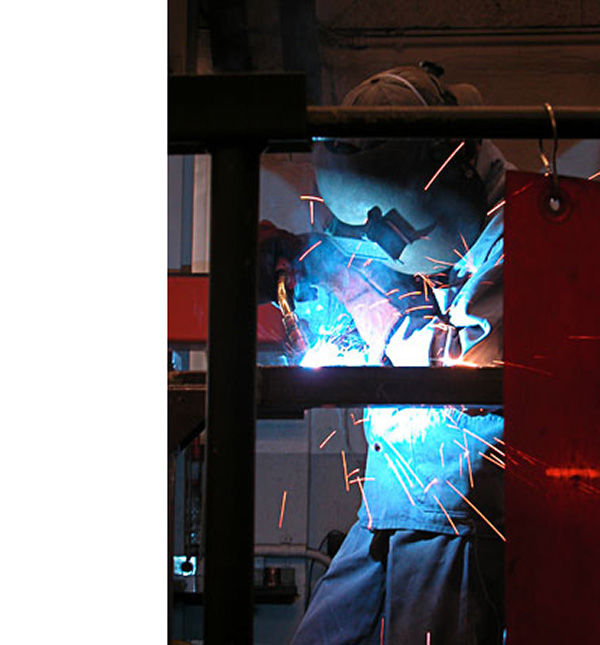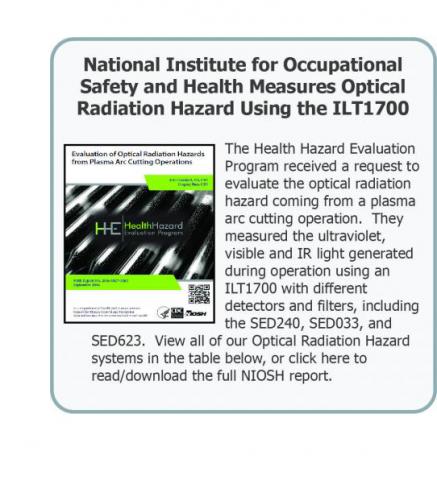
Optical Radiation Hazard Light Meters
International Light Technologies (ILT) has designed a selection of systems to measure almost any Optical Radiation Hazard application as defined by ICNIRP, ACGIH and EU Directive 2006/25/EC.
Sources emitting optical radiation are of paramount concern to hygienists, safety engineers, and public health officials, both from their beneficial effects and their potential as a hazard to health and safety.
International Light Technologies has a long history measuring optical hazard radiation. ILT's first product for these measurements, the (ILT)ACT5 filter, was based on the ICNIRP* / ACGIH* spectral sensitivity function.
Our product offering in this area has expanded to include products for testing based on EU Directive 2006/25/EC*. Although our product line does not include a high priced research grade double monochromator, ILT has designed a versatile, lower cost, easy to use portable selection of systems to measure almost any Optical Radiation Hazard application with N.I.S.T. traceable and ISO/IEC 17025:2017 Accredited calibrations.
Many common light sources can produce various damaging health conditions.Welding and cutting equipment, lasers, office copiers, air sterilizers, and infrared heat lamps are some of the more commonly encountered optical radiation hazards. While most people are familiar with the damaging effects of continued exposure to the sun or even of the dangers of short-term exposure to welding equipment, many people are not familiar with the more subtle, but equally damaging optical radiation hazards presented by some of these other sources.

Artificial UV light sources, useful for photo-etching, curing adhesives, paint and coatings, air, water sterilization, and controlled plant growth isn't visible to the human eye and can go undetected without realizing the damage that is being done until it is too late.
These artificial sources can have UV levels many more times that of the sun producing a risk for greater injury in less time. Although knowledge about optical radiation hazards from UV light sources may be more obvious, thanks in large part to the sun and all of its publicity, the hazards presented by infrared and blue sources are just as real but far less known.
Lasers, found in almost every home or office in the shape of CD drives, DVD players, cutting equipment, measurement devices, indicators, and as research tools can focus tremendous amounts of optical energy into a tiny spot capable of tremendous amount of damage to the human eye or skin.
Even the smaller, less focused beams caused by scattering pose potential hazards. Some of the harmful effects which can be produced by these types of sources as well as others can include erythema (skin redness), photokeratosis (inflammation of the cornea more commonly referred to as "snow blindness"), skin cancer, Vitiligo (de-pigmentation of the skin), conjunctivitis, and temporary or permanent loss of vision. Continuous or repetitive exposure to low level sources may produce cumulative damage such as cataracts, blindness and cancer.
Safety professionals must weigh the risks against the benefits. While all these sources have great benefits, the risks are there and must carefully be accounted for and personnel protection assured. Industrial hygienists, safety engineers, and public health officials must weigh the factors of human health, safety, and well being against any benefits derived from such sources. As these sources have grown more commonplace, so too has the assessment of these hazards through direct measurement of their light output against national and/or international standards for acceptable levels of human exposure.
ILT has a selection of systems to measure almost any Optical Radiation Hazard application.
ILT meters come with NIST traceable, ISO/IEC 17025:2017 accredited calibrations in units of Watts, Lumens, Watt/cm2, lux and foot-candles as well as full spectrum analysis.
Input optics, including small cosine receptors, integrating spheres, narrow beam adapters and apertures (for testing uniformity) can be added to ILT systems making them the most versatile systems available.
ILT engineers and technical support staff are available to customize systems to the unique requirements of our customers.
Use the table below to identify the system (meter + detector) that meets your specific application. Use the table to find the spectral range you wish to measure. The table can be filtered to show our meters by type, (e.g., hand-held), as well as searching on the minimum and maximum spectral range you wish to measure. The tables can also be sorted to group systems by meter type, spectral range, measurement range, and units. Click the product link of the system to view it's details.
Need assistance? Contact us using the form below, or by calling us at 978-818-6180.
* ICNIRP - International Commission on Non-Ionizing Radiation Protection
* ACGIH - American Conference of (Governmental) Industrial Hygienists
* EU Directive 2006/25/EC - an EU directive on the minimum health and safety requirements regarding the exposure of workers to risks arising from artificial optical radiation.
** EU DIRECTIVE 2006/26/EC: The range of 300 to 700 nm covers parts of UVB, all of UVA and most visible radiation, however the associated hazard is commonly referred to as "blue light". Blue light, strictly speaking, covers only the range of approximately 400 to 490 nm.
* All Radiometers/Photometers/Spectroradiometers are NIST Traceable.
* If units of measure are not shown please contact us (empirical units also available i.e.fc, fL, nits, lm/ft²).
< Back to Light Measurement Systems
Explore All Light Meters By Application Type
- Germicidal UV Radiometers & Spectrometers
- UV Curing Light Measurement Systems
- Audience Scanning Radiometers & Spectrometers
- Endoscopic System Light Meters
- Pulsed Light Measurement Systems
- LED Testing & Measurement
- Low Light Level Measurement
- Optical Radiation Hazard Light Meters
- Photodynamic Therapy Radiometers & Spectrometers
- Photometric Spectral Light Meters
- Photoresist Radiometers & Photometers
- Photostability UVA Detectors
- Phototherapy Light Meters & Radiometers
- Plant Photobiology & Photomedicine Light Meters
- Radiometry Light Meters
- Solar Radiation Light Meters
